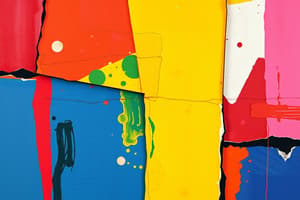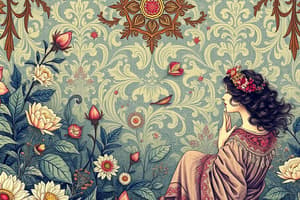Podcast
Questions and Answers
What are the seven elements of art?
What are the seven elements of art?
- Line
- Shape
- Texture
- All of the above (correct)
What is a line?
What is a line?
A mark made on a surface that spans a distance between two points.
What is a shape?
What is a shape?
A flat area of enclosed space.
What defines geometric shapes?
What defines geometric shapes?
What are organic shapes?
What are organic shapes?
What does tone refer to in art?
What does tone refer to in art?
What are the three properties of color?
What are the three properties of color?
What is space in art?
What is space in art?
What characterizes 2D artwork?
What characterizes 2D artwork?
What defines 3D artwork?
What defines 3D artwork?
What does form refer to in art?
What does form refer to in art?
Value describes how light or dark a color is.
Value describes how light or dark a color is.
Hue refers to a color after it has been altered.
Hue refers to a color after it has been altered.
What is intensity in relation to color?
What is intensity in relation to color?
What is shade in color theory?
What is shade in color theory?
What are positive spaces in art?
What are positive spaces in art?
What does perspective mean in graphic arts?
What does perspective mean in graphic arts?
What is painting?
What is painting?
What is pigment?
What is pigment?
What are visual arts?
What are visual arts?
Flashcards are hidden until you start studying
Study Notes
Elements of Art
- The seven elements are line, shape, space, value, form, texture, and color; fundamental for creating art.
Line
- A mark spanning between two points; can be straight, curved, zig-zagged, or dotted.
- Characteristics include width, direction, and length.
Shape
- Defined as a flat area of enclosed space, categorized as either geometric or organic.
Geometric Shapes
- Mathematical in nature with clear sides; includes basic shapes like squares, circles, and triangles.
- Often symmetrical and can form complex patterns in art.
Organic Shapes
- Characterized by less-defined, flowing edges; shapes are often unpredictable.
- Can exhibit both symmetry and asymmetry.
Tone
- Refers to the lightness or darkness of an area; differs from highlights.
- Influenced by the object's surface characteristics and its contrast with the background.
Color
- Produced when light reflects off an object; composed of three properties: hue, intensity, and value.
Space
- Represents the illusion of depth on a flat surface; encompasses background, foreground, and middle ground.
- Relates to distances around, between, and within objects.
Cube
- A three-dimensional geometric figure with six equal square faces.
2D (Two Dimensional)
- Flat artwork that may suggest depth; can be purely abstract or provide a perspective illusion.
3D (Three Dimensional)
- Sculptural form with depth, width, and height, creating physical presence.
Form
- In 2D art, it creates the illusion of space and volume; in 3D, it forms the basis of sculpture.
- Achieved through techniques like perspective, shading, or modeling.
Stroke
- Another term for a line within artistic contexts.
Value
- Describes the lightness or darkness of a color; applicable in grayscale as well.
Hue
- The pure form of a color; describes colors before any shades or tints are applied.
Intensity
- Refers to the vividness or saturation of a color; indicates a color's purity without alteration.
Shade
- A darker version of a color created by adding black or darker hues.
Positive and Negative Space
- Positive space is occupied by subjects or objects in artwork.
- Negative space refers to the empty areas around or within the subjects.
Perspective
- A method of depicting three-dimensional images on a flat surface to convey depth visually.
Painting
- The practice of applying pigment to surfaces like canvas, creating images through color application.
Pigment
- A substance that provides color to materials and objects in art.
Visual Arts
- Includes diverse forms such as ceramics, drawing, painting, sculpture, printmaking, design, crafts, photography, and video.
Studying That Suits You
Use AI to generate personalized quizzes and flashcards to suit your learning preferences.




